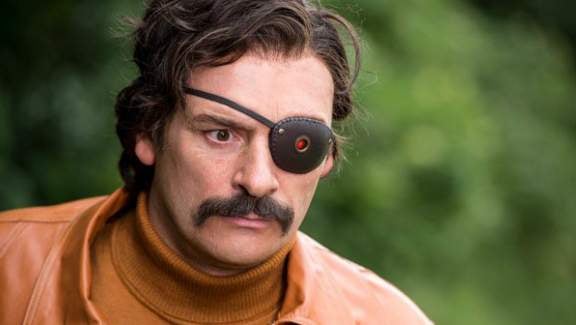
Julian Barratt stars as the deluded actor who desperately attempts to turn a series of brutal murders into an opportunity to revive his failed career in this delightfully silly comedy. Amelia Curran reviews
Co-written by Barratt and Simon Faranby, Mindhorn reinvigorates familiar tropes of British television with the comic absurdity that is to be expected from one of the minds behind The Mighty Boosh. The film, which took over 10 years from its original conception to completion (during which time Barratt, by his own admission, ‘ripened’ to fit the title role), whimsically combines the comedy of self-delusion with a deliciously silly plot, parodic nostalgia for the ’80s cop drama. Theatre director Sean Foley makes his film debut with style, lending the film an energetic pace and heightening the playful tone.
Barratt stars as Richard Thorncroft, an actor who enjoyed short-lived celebrity in the 1980s series, Mindhorn, a campy detective drama whose eponymous hero is fitted with a bionic eye that enables him to literally “see the truth”. High off this limited success, Thorncroft makes an obnoxious appearance on Wogan in which he slates and alienates everyone he knows before skipping to Hollywood, where he is met with predictable rejection and is forced to return sheepishly home.
Now, many years on, he finds himself living alone in a Walthamstow bedsit left with nothing but surplus paraphernalia from the glory days and a lingering sense of self-importance that spawns much of the humour throughout the film. While other jokes may become a tad laboured towards the end, Barratt’s brilliant performance ensures that the protagonist’s ego remains amusing until the film’s final and suitably farcical conclusion.
All seems lost for Thorncroft. Following yet another catastrophic audition, he flounces to his exasperated agent’s office to re-instate his own brilliance and demand better work. Much to his surprise, she offers him an exceedingly unusual opportunity- to assist with a murder investigation on the Isle of Man, the set of Mindhorn and now home to Thorncroft’s former lover and co-star, Patricia Deville (Essie Davis). The police’s sole lead and suspected perpetrator of the crimes is a man who calls himself the Kestrel (portrayed endearingly with wide-eyed naivety and petulance in
equal measure by Russell Tovey), an emotionally stunted man-child fixated on Mindhorn who will refuse to cooperate with anyone- except the fictional detective himself. Interpreting this as a stellar opportunity to boost his career and win back the girl, Thorncroft gleefully accepts the proposition.
On arrival back in the Isle of Man, Thorncroft’s delusions of grandeur reach their ridiculous peak. His first trip to the police department, an overtly drab building which he treats as though it were a lavish Los Angeles dressing room, is particularly funny, as is his first meeting with the Kestrel, who he mistakes as the photographer he hired to document his supposed return to the spotlight. The majority of the central characters share this sense of self-aggrandisement: the Kestrel is fooling
nobody with his ludicrously contrived alias and is forced to continuously reiterate his mysterious anti-hero status, while (Linda), despite insisting that she is a ‘serious journalist’, in reality finds herself reporting on trivial stories such as the history of the Manx cat. Thorncroft’s arch-rival, Linda’s tangerine-tanned and ever-topless European husband (humorously played by Simon Faranby), is the epitome of self-satisfaction. Pretty much everyone is a caricature, and the few who aren’t (one notable example being Linda’s teenage daughter, who is inadvertently thrust into the
centre of one of Thorncroft’s many misunderstandings) serve as wry, witty touchstones of normality in Barratt and Faranby’s madly amplified world.
While there are undoubtedly laugh-out-loud moments, there are a couple of points towards the end in which certain jokes do feel a little overworked. Though well acted by Richard McCabe, the character of Thorncroft’s washed-up, coke-addled Isle of Man agent was also slightly too bleak by the end and somewhat lowered the jovial tone. On the whole, however, a highly enjoyable, lighthearted watch, brimming with nostalgia and firmly bolstered by some memorable performances, particularly Barratt, who shines with an exceptional comic performance.






